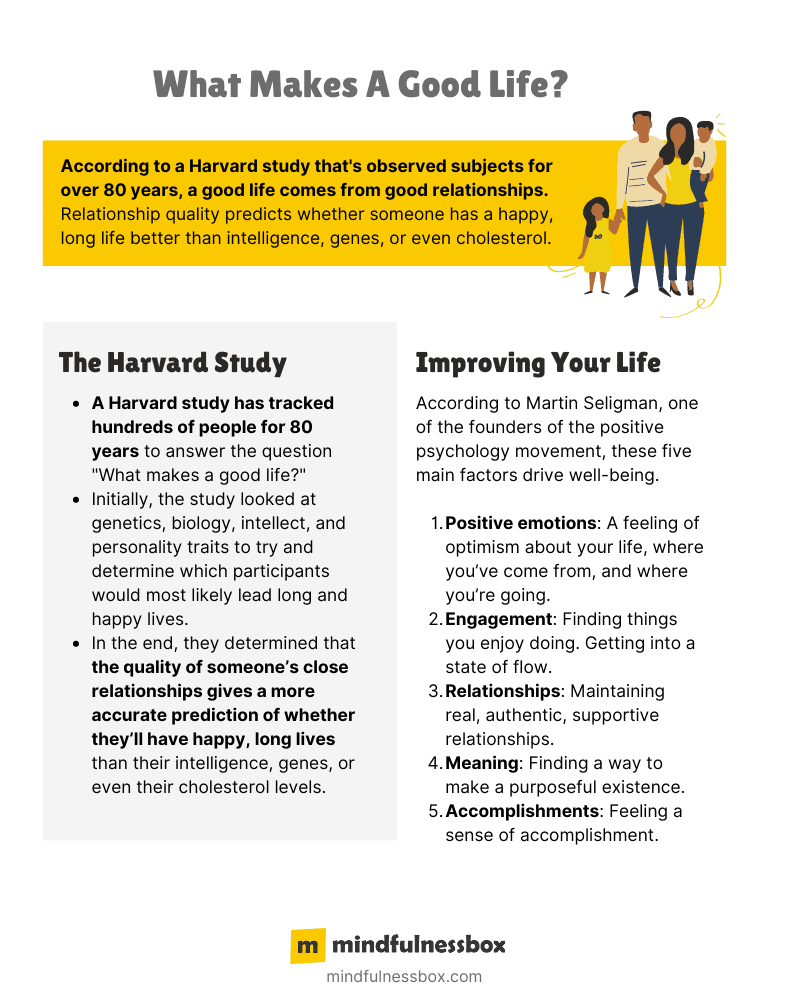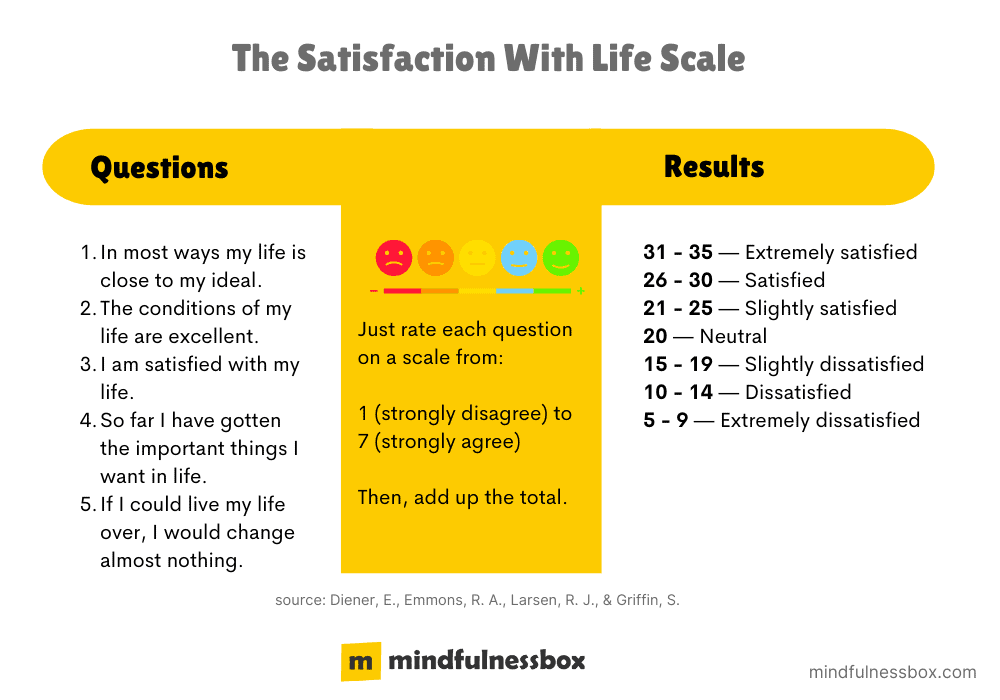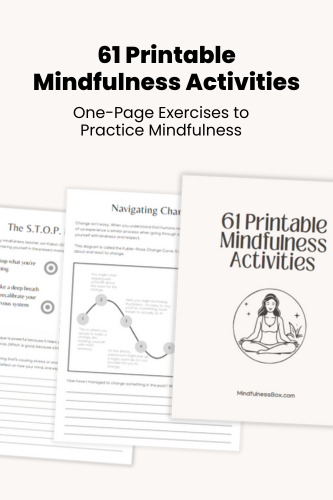What makes a good life? According to a Harvard study that’s observed subjects for over 80 years, a good life comes from good relationships. Relationship quality gives a more accurate prediction of whether people will have happy, long lives than their intelligence, genes, or even their cholesterol levels.
Most days, we wake up and get on with the business of the day.
How often do we stop and think about what actually makes up a good life? How often do we have a chance to consider whether our actions are moving us towards life satisfaction?
Get dozens of one-page exercises to help practice mindfulness, meditation, gratitude, and self love. Perfect for printable handouts when teaching mindfulness to groups, students, or in the workplace.
To see examples, plus a full list of the 61 exercises included, click below.
It’s easy to lose track of our end goal and find ourselves leading, as Socrates said, an “unexamined life.”
Fortunately, research on what makes for a happy life has flourished in recent decades, and the consensus is clear:
A good life comes from good relationships.
What makes a good life?

A Harvard study has explored the question “What makes a good life?” for 80 years. In 1938, the Harvard Study of Adult Development began tracking 268 students with the goal of understanding what makes for a healthy and happy life.
Initially, the study looked at genetics, biology, intellect, and personality traits to try and determine which participants would most likely lead long and happy lives. Over time, the focus expanded to incorporate data on relationships.
Robert Waldinger, director of the study, said that the most surprising takeaway was that healthy relationships drive longevity and physical health:
“The surprising finding is that our relationships and how happy we are in our relationships has a powerful influence on our health… Loneliness kills. It’s as powerful as smoking or alcoholism.”
According to the Harvard study, the quality of someone’s close relationships gives a more accurate prediction of whether they’ll have happy, long lives than their intelligence, genes, or even their cholesterol levels.
Robert Waldinger gave an excellent TED talk on this topic in 2015. It’s worth watching in its entirety.
5 factors that make life worth living

Martin Seligman is considered one of the founders of the positive psychology movement, which focuses on studying positive outcomes in peoples’ lives.
Seligman laid out five factors that contribute to well-being. Each of these also give us some insight into life satisfaction:
- Positive emotions: A feeling of optimism about your life, where you’ve come from, and where you’re going.
- Engagement: Finding things you enjoy doing. Getting into a state of flow.
- Relationships: Maintaining real, authentic, supportive relationships.
- Meaning: Finding a way to make a purposeful existence.
- Accomplishments: Feeling a sense of accomplishment.
However, it’s possible to feel life satisfaction despite not checking the box on these well-being indicators above. Life satisfaction is an entirely subjective experience.
Are you satisfied with your life?

The Satisfaction With Life Scale is a short measure of life satisfaction—only five questions.
You can take it right now, if you want to get an objective sense for your current level of life satisfaction.
Here are the questions:
- In most ways my life is close to my ideal.
- The conditions of my life are excellent.
- I am satisfied with my life.
- So far I have gotten the important things I want in life.
- If I could live my life over, I would change almost nothing.
Just rate each question on a scale from 1 (strongly disagree) to 7 (strongly agree). Then, add up the total.
The researchers who developed this scale also provided a set of loose benchmarks to determine where you might land:
- 31 – 35 — Extremely satisfied
- 26 – 30 — Satisfied
- 21 – 25 — Slightly satisfied
- 20 — Neutral
- 15 – 19 — Slightly dissatisfied
- 10 – 14 — Dissatisfied
- 5 – 9 — Extremely dissatisfied
How to improve life satisfaction

“Life can only be understood backwards; but it must be lived forwards.”
Soren Kierkegaard
We all want to be happy and satisfied with our lives. But as Kierkegaard alludes in this quote, we often don’t understand what made us happy and satisfied until years later, when we’re able to look at our lives in retrospect.
Fortunately, we have extensive research on the subject.
The most critical component of life satisfaction is the quality of the relationships you cultivate: with your spouse, your kids, your family, and your community.
Relationships are not only the primary takeaway of the Harvard Study of Adult Development; they also feature prominently in measures of well-being like psychologist Martin Seligman’s theory of well-being.
Other areas you can work on are seeking meaning, working towards big goals in order to feel a sense of accomplishment, engaging in activities that creates a sense of flow, and practicing gratitude in order to increase your optimism and positive emotions.
But if there’s one thing the research points to, it’s this:
Improving your relationships helps you live a happier, healthier, longer life.
Further reading
For more on living a happy life, check out:
- How to Find Happiness Within Yourself
- How to Appreciate Life (And Stop Taking It For Granted)
- Life Is Not A Problem To Be Solved, But A Reality to Be Experienced
- How to Increase Your Happiness Set Point
Frequently asked questions
Why is life satisfaction important?
Life satisfaction is the goal we’re all seeking, but we often take different routes to get there.
Understanding what’s likely to lead us to life satisfaction is key, because otherwise we may waste our lives working towards goals that don’t contribute to our happiness, life satisfaction, and well-being.
What factors affect life satisfaction?
Factors affecting life satisfaction include the five principal well-being factors: positive emotions, engagement (doing activities you enjoy), relationships, meaning, and accomplishments.
According to the Harvard Study of Adult Development, the following factors also contribute to a happy and healthy life: physical activity, no alcohol abuse or smoking, ability to cope with life’s ups and downs, maintaining a healthy weight, and having a stable marriage.
How to improve life satisfaction
The single most powerful way to improve your life satisfaction is to work on the quality of your relationships. Relationships are the key takeaway from the Harvard Study of Adult Development, also feature prominently in psychologist Martin Seligman’s theory of well-being.
According to the Harvard Study of Adult Development, the quality of a person’s relationships and marriage do the best job of predicting whether they’ll have a happy, healthy life.
It’s also important to focus on well-being and meaning. According to psychologist Martin Seligman, five factors that contribute most to well-being are: positive emotions, engagement (doing activities you enjoy), relationships, meaning, and accomplishments.

My mindfulness practice kicked off in 2016 with a ten-day silent retreat. Since then, I’ve read dozens of books about mindfulness and completed hundreds of hours of meditation. Thinking about what makes humans happy, calm, and peaceful is endlessly fascinating to me.


